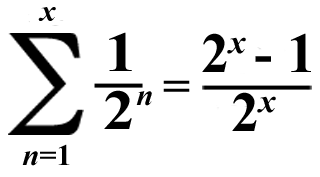

According to the table below, the sum will be equal to these fractions if x is equal to these natural numbers:
| x | Sum |
| 1 | 1/2 |
| 2 | 3/4 |
| 3 | 7/8 |
| 4 | 15/16 |
| 5 | 31/32 |
| 6 | 63/64 |
| 7 | 127/128 |
| 8 | 255/256 |
| 9 | 511/512 |
| 10 | 1023/1024 |

Obviously, the denominator is always equal to a power of 2, but the numerator will be equal to the consecutive integer before that, every time! However, x can't be equal to a number that's less than 1. You can't pick a non-integer for x either, because this is summation.
Back to Index Page Back to Math Trick Menu
© Derek Cumberbatch